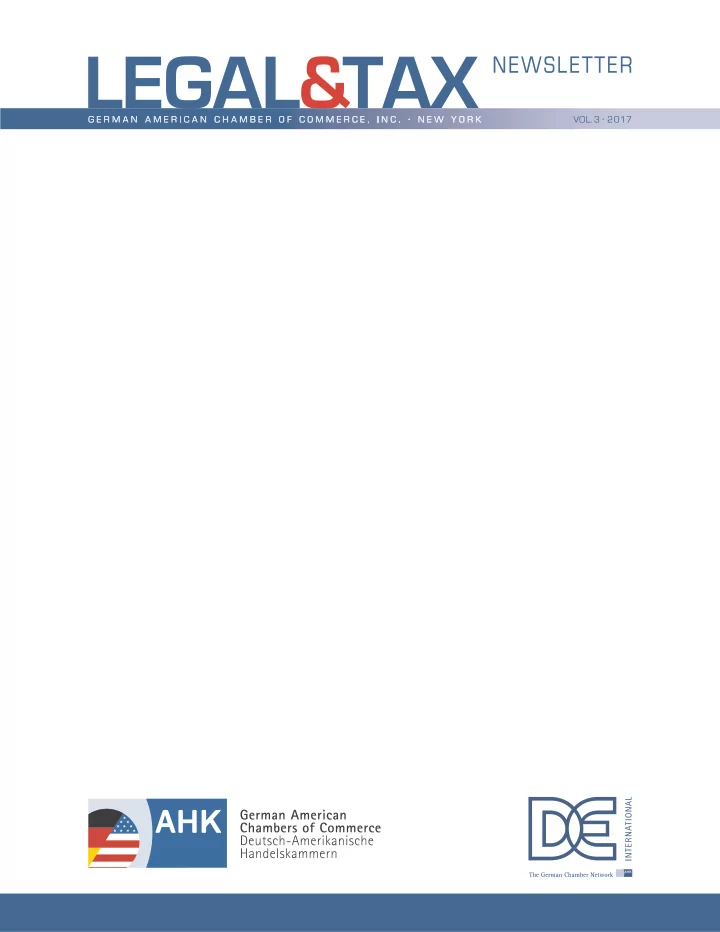

VOL. 3 • 2017
VOL. 3 • 2017 U.S. Supreme Court Further Limits Forum Shopping The U.S. legal system is often considered to be “plaintiff-friendly.” Relatively low court fees, the availability of contingency fees, extensive pre-trial discovery, jury trials, and the potential for punitive damages awards all foster that perception. As a result, U.S. courts have attracted claims by plaintiffs even when there is little or no connection between the place where the lawsuit is filed (the “forum”) and the plaintiffs or legal issues in question – a practice known as “forum shopping.” Birgit Kurtz In recent years, however, the U.S. Supreme Court has substantially curtailed the Director, Business & Commercial phenomenon of “forum shopping” by restricting a U.S. court’s jurisdiction – essentially Litigation Department T +1 (212) 613 2009 the court’s power to hear a case – to certain kinds of claims and types of parties. Of F +1 (212) 554 9618 particular interest to German companies is the Supreme Court’s recent jurisprudence bkurtz@gibbonslaw.com regarding “personal jurisdiction” – the power of a U.S. court to bring foreign defendants into the U.S. or have them risk the entry of a default judgment. There are two types of personal jurisdiction – “general” and “specific” – and the Supreme Court has recently circumscribed both. General Jurisdiction General jurisdiction gives a court the power over a particular defendant to decide claims against that defendant even where those claims arose outside of the forum, including outside the U.S. We have previously reported here (Vol. 2, 2016, at pages 4-5) that, after the U.S. Supreme Court decision in Daimler v. Bauman, courts now have “general jurisdiction” only (with few exceptions) where the corporate defendant is “essentially at Jeffrey L. Nagel Director, Business & Commercial home,” i.e., in the state of incorporation or at the location of the company’s principal place Litigation Department of business. T +1 (212) 613 2061 F +1 (212) 554-9661 jnagel@gibbonslaw.com Specific Jurisdiction Gibbons P.C. A court has specific jurisdiction over a defendant if the plaintiff’s claim “arises out of” One Pennsylvania Plaza, a particular contact with the state, e.g., out of the defendant’s sale of a product in the 37th Floor New York, NY 10119 forum state. In June 2017, the Supreme Court clarified the limits of specific jurisdiction www.gibbonslaw.com by emphasizing the requirement that the claim must “arise out of” conduct that the defendant had “purposefully directed” toward the forum state. In Bristol-Myers Squibb Co. v. Superior Court, 678 plaintiffs sued a U.S. drug company (“BMS”) in a California state court for damages allegedly resulting from a particular drug. Of the 678 plaintiffs, 592 were not residents of California, and BMS challenged the court’s personal jurisdiction as to the claims raised by those nonresidents. 5
VOL. 3 • 2017 U.S. Supreme Court Further Limits Forum Shopping Birgit Kurtz Director, Business & Commercial Litigation Department BMS was incorporated in Delaware and headquartered in New York. Thus, the California T +1 (212) 613 2009 F +1 (212) 554 9618 court did not have “general jurisdiction” over BMS because the company was not “at bkurtz@gibbonslaw.com home” in California. Jeffrey L. Nagel As to specific jurisdiction, the Supreme Court held that (based on the fairness Director, Business & Commercial requirement in the constitutional “due process” clause applicable to state courts) a Litigation Department T +1 (212) 613 2061 plaintiff in a state court must demonstrate an “adequate link” between his claim and F +1 (212) 554-9661 the defendant’s conduct in the forum state. The Court noted that the nonresidents were jnagel@gibbonslaw.com not prescribed the drug in California, did not obtain or ingest it there, and were not Gibbons P.C. injured in that state. The Court then examined the conduct that BMS had purposefully One Pennsylvania Plaza, directed toward California and held: “The bare fact that BMS contracted with a California 37th Floor New York, NY 10119 distributor is not enough to establish personal jurisdiction in the State.” www.gibbonslaw.com Thus, the Supreme Court found that the nonresident plaintiffs had not shown an adequate link between BMS’s conduct in California and the claims of the plaintiffs who resided outside of California. In other words, the claims of the non-Californian plaintiffs did not “arise out of” BMS’s California conduct. The California court, therefore, did not have “specific jurisdiction” over any of the claims brought by the nonresident plaintiffs. The Supreme Court expressly left open the question whether the constitutional analysis that limited the jurisdiction of state courts would apply equally to federal courts. Conclusion In recent years, U.S. courts have significantly limited the power of courts over parties and claims that have little if any connection to the forum. As a result, U.S. courts today are far less welcoming than they were only 10 or 15 years ago to plaintiffs who seek to bring claims that either arose outside of the U.S. or are brought against non-U.S. defendants. Nonetheless, plaintiffs (and their counsel) are likely to develop creative arguments and strategies to achieve their “forum shopping” goals, and German companies remain well- advised to continue to be prepared for litigation in U.S. courts and to be knowledgeable about the various jurisdictional defenses available to them. 6
DISCLAIMER: The content in this newsletter is provided by the German American Chamber of Commerce, Inc. and its third party content providers for general informational purposes only. It is not intended as professional counsel and should not be used as such. You should contact an attorney to obtain advice with respect to your specific circumstances. The German American Chamber of Commerce, Inc. shall not be liable for any errors, inaccuracies in content, or for any actions taken in reliance thereon. Susanne Gellert, LL.M. Rechtsanwältin | Attorney at Law Director Legal Department & Business Development Consulting 80 Pine Street, Floor 24 | New York, NY 10005 +1 (212) 974 8846 | +1 (212) 974 8867 legalservices@gaccny.com www.gaccny.com
Recommend
More recommend